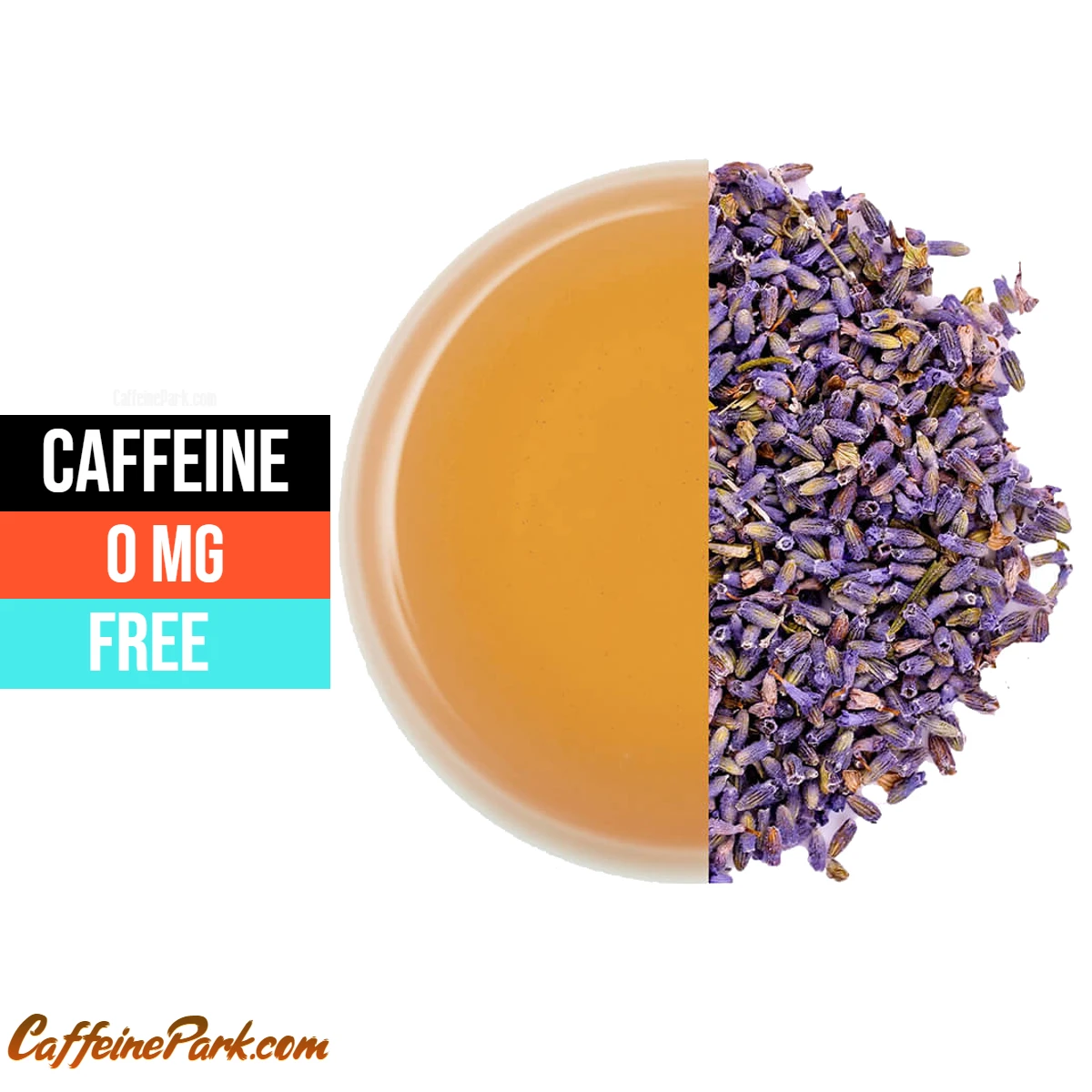
Have you ever wondered about the caffeine content in lavender tea? Well, let me put your mind at ease. Lavender tea is a delightful herbal infusion that is naturally caffeine-free. That’s right, no caffeine! So, if you’re looking for a soothing and relaxing beverage without the jolt of caffeine, lavender tea is your perfect match.
Lavender tea is derived from the Lavandula angustifolia plant, which is known for its beautiful purple flowers and enchanting fragrance. This plant doesn’t contain any caffeine, making lavender tea a safe choice for those who want to reduce or eliminate their caffeine intake. So, whether you’re sensitive to caffeine or simply prefer to stay away from it, lavender tea offers a refreshing and caffeine-free alternative.
But that’s not all! Lavender tea not only lacks caffeine, but it also boasts a delightful flavor profile. With its floral and slightly sweet taste, sipping a cup of lavender tea is like taking a leisurely stroll through a lavender field on a sunny day. So why not treat yourself to a moment of tranquility and indulge in the calming effects of lavender tea? Grab your favorite mug, brew a cup of this fragrant herbal infusion, and savor its natural goodness.
Does Lavender Tea have Caffeine?
No, Lavender tea itself does not naturally contain caffeine. Lavender is an herb that is typically caffeine-free.
| Size of Cup | Caffeine Content | CAFFEINE STRENGTH |
|---|---|---|
| Small (6 oz) | 0 mg | Caffeine-Free |
| Medium (8 oz) | 0 mg | Caffeine-Free |
| Large (12 oz) | 0 mg | Caffeine-Free |
| Extra-Large (16 oz) | 0 mg | Caffeine-Free |
- Caffeine Amount: 0 mg
- Caffeine strength: Free-Caffeine
- Serving Size: 8 fl oz
However, it’s important to note that some commercially available lavender tea blends may include other ingredients, such as black tea or green tea, which do contain caffeine. In such cases, the caffeine content will depend on the specific blend and the proportion of these ingredients.
If you are specifically looking for a caffeine-free option, it is advisable to check the ingredients list or product description of the lavender tea you are considering to ensure that it does not contain any caffeine-containing ingredients. Pure lavender tea, made solely from lavender flowers, should not have any caffeine.
Caffeine in Lavender Tea vs. Other Teas
When it comes to caffeine content, lavender tea stands out as a true caffeine-free option. While many other teas offer a variety of flavors and health benefits, they also contain varying amounts of caffeine. Let’s compare lavender tea to some popular tea varieties in terms of their caffeine content per 8 fl oz serving:
| ITEMS | SERVING SIZE | CAFFEINE |
|---|---|---|
| Lavender Tea | 8 fl oz | 0mg |
| Kombucha Tea | 8 fl oz | 24mg |
| Yellow Tea | 8 fl oz | 63mg |
| Green Tea | 8 fl oz | 18mg |
| White Tea | 8 fl oz | 28mg |
| Oolong Tea | 8 fl oz | 37mg |
| Jasmine Tea | 8 fl oz | 25mg |
| Instant Tea | 8 fl oz | 40mg |
| Decaf Tea | 8 fl oz | 4mg |
| Black Tea | 8 fl oz | 42mg |
| Matcha Tea | 8 fl oz | 64mg |
| Teavana Tea | 8 fl oz | 41mg |
| Guayusa Tea | 8 fl oz | 41mg |
As you can see, lavender tea stands apart with its zero caffeine content, making it an ideal choice for those who want to avoid the stimulating effects of caffeine. If you’re looking for a gentle and caffeine-free option, lavender tea allows you to enjoy a soothing cup without worrying about the jitters or sleep disturbances that caffeine can cause.
So, whether you’re sensitive to caffeine, prefer to limit your intake, or simply enjoy the tranquility of caffeine-free beverages, lavender tea is a fantastic choice. Embrace the calming properties and delightful flavor of lavender tea, and experience a peaceful moment with every sip.
Why doesn’t lavender tea contain caffeine?
Lavender tea is made from the dried flowers of the lavender plant, which does not contain caffeine. This means that even if you steep the flowers in hot water for an extended period of time, you will not extract any caffeine.
It’s worth noting that there are some teas that are made with lavender flowers and do contain caffeine, such as Earl Grey tea. Earl Grey is a black tea that is flavored with bergamot oil and often includes lavender flowers as well. However, the caffeine in Earl Grey comes from the tea leaves, not the lavender flowers.
Benefits of drinking lavender tea
Are you ready to embark on a fragrant journey filled with relaxation and wellness? Look no further than lavender tea! This delightful herbal infusion not only offers a soothing and aromatic experience but also brings a myriad of benefits to your overall well-being. So, grab your favorite mug, settle into a cozy spot, and allow me to introduce you to the incredible world of lavender tea.
1. Calming Effects to Soothe Your Mind and Body
One of the most well-known benefits of lavender tea is its ability to promote relaxation and calmness. The enchanting scent of lavender has long been associated with tranquility, and when infused into tea, it can work wonders on your state of mind. Sipping on a warm cup of lavender tea can help reduce anxiety, relieve stress, and even aid in sleep. It’s like having a peaceful meadow in a cup!
2. Improved Sleep Quality for Sweet Dreams
If you find yourself tossing and turning at night, lavender tea might just be the solution you’ve been searching for. The natural compounds found in lavender, such as linalool and linalyl acetate, possess sedative properties that can help lull you into a deep and restful sleep. Say goodbye to restless nights and hello to sweet dreams with a cup of lavender tea before bedtime.
3. Digestive Aid for a Happier Tummy
Lavender tea isn’t just a treat for the senses; it can also be a boon for your digestive system. If you struggle with bloating, indigestion, or other gastrointestinal discomforts, sipping on lavender tea can provide relief. Lavender’s gentle antispasmodic properties can help soothe stomach muscles, reduce gas and bloating, and promote healthy digestion. So, the next time your tummy feels a bit off, reach for a comforting cup of lavender tea.
4. Natural Stress Buster to Melt Away Tension
We all face stress in our daily lives, but lavender tea can be your ally in combating its effects. The act of brewing and savoring a cup of lavender tea can be a meditative experience in itself. The aroma alone can help calm your nerves and create a sense of serenity. Plus, lavender contains compounds that interact with your brain to reduce stress hormones, promoting a relaxed state of mind. Take a mindful pause, sip on some lavender tea, and let your worries melt away.
5. Headache Relief for a Soothing Respite
When a pounding headache threatens to derail your day, lavender tea can come to the rescue. The analgesic properties of lavender can help alleviate headaches and migraines. By sipping on lavender tea, you can experience a soothing respite as tension eases away. It’s a natural and gentle alternative to over-the-counter pain relievers. So, the next time a headache strikes, let lavender tea be your comforting companion.
6. Antioxidant Powerhouse for Overall Health
Lavender tea is not only a delightful treat but also a source of powerful antioxidants. Antioxidants help protect your body from free radicals, which are unstable molecules that can cause cellular damage. By incorporating lavender tea into your routine, you provide your body with a delicious way to boost its antioxidant defenses. These antioxidants can support your overall health and well-being, keeping you feeling vibrant and revitalized.
7. Anti-Inflammatory Support to Soothe Aches and Pains
Inflammation can be the root cause of various ailments, from joint pain to chronic diseases. Lavender tea contains compounds with anti-inflammatory properties that can help reduce inflammation in the body. Regular consumption of lavender tea may offer support for those dealing with arthritis, muscle soreness, and other inflammatory conditions.
8. Immune System Boost for Vitality
A strong immune system is the foundation of good health, and lavender tea can lend a hand in fortifying your body’s defenses. Lavender contains certain compounds that possess antimicrobial and immune-boosting properties. By incorporating lavender tea into your daily routine, you can give your immune system a natural and aromatic boost, helping to ward off common illnesses and keeping you feeling vibrant and energetic.
9. Skin Care Elixir for a Radiant Glow
Lavender isn’t just a treat for your senses; it can also work wonders for your skin. When applied topically, lavender oil has been known to help soothe various skin conditions, including acne, eczema, and minor irritations. By drinking lavender tea, you can enjoy some of these skin-loving benefits from within. The antioxidants found in lavender tea help promote healthy skin by fighting free radicals and supporting a youthful, radiant complexion.
10. Respiratory Relief for Clear Breathing
If you suffer from respiratory issues like coughs, colds, or allergies, lavender tea can provide some much-needed relief. The soothing and anti-inflammatory properties of lavender can help calm irritated airways, reduce congestion, and promote clear breathing. So, the next time your respiratory system needs a little TLC, brew yourself a cup of lavender tea and breathe in the soothing aroma.
11. Hormonal Balance for Women’s Health
For women dealing with hormonal imbalances or menstrual discomfort, lavender tea can be a gentle ally. It has been traditionally used to help regulate menstrual cycles, alleviate cramps, and ease symptoms associated with PMS (premenstrual syndrome). Sipping on lavender tea during these times can provide a soothing and comforting experience, helping to restore balance to your body and mind.
12. Mood Booster for a Happier You
In addition to its calming properties, lavender tea can also act as a natural mood booster. The aroma of lavender has been found to have uplifting effects on mood, promoting feelings of positivity and contentment. So, if you’re feeling a little down or in need of a pick-me-up, reach for a cup of lavender tea and let its aromatic magic work its wonders.
13. Weight Management Support for Healthy Goals
If you’re on a journey towards maintaining a healthy weight, lavender tea can be a delightful addition to your routine. It is a naturally low-calorie and caffeine-free beverage that can satisfy your taste buds without adding extra calories. Additionally, lavender tea may help support weight management efforts by reducing stress-related eating and promoting better digestion. It’s a flavorful and figure-friendly choice to support your healthy lifestyle goals.
14. Aromatherapy Benefits for Mental Well-being
While we’ve primarily focused on the benefits of drinking lavender tea, it’s worth mentioning that the mere scent of lavender itself can have remarkable effects on mental well-being. Aromatherapy with lavender essential oil has been shown to reduce anxiety, improve sleep quality, and enhance overall mood. So, whether you’re brewing a cup of lavender tea or using lavender-infused products, the delightful aroma alone can create a serene and uplifting atmosphere.
15. Versatility in Culinary Delights
Lavender tea isn’t just limited to a soothing beverage; it can also add a unique twist to your culinary creations. From baked goods to desserts and savory dishes, lavender tea can infuse your recipes with its delicate floral notes. Imagine lavender-infused cookies, lavender lemonade, or lavender-infused syrups for cocktails. The possibilities are endless, and the flavors are sure to delight your taste buds.
Side Effects of lavender tea
While lavender tea is generally considered safe for most people, it’s crucial to understand that, like any herbal remedy, it may have potential side effects, especially when consumed in excessive amounts or by certain individuals. So, let’s delve into the topic of lavender tea’s potential side effects and how to enjoy this delightful brew responsibly.
1. Allergic Reactions: Uncommon, but Possible
Although rare, allergic reactions to lavender tea are possible, particularly in individuals who are sensitive or allergic to the Lamiaceae family of plants, which includes lavender. Symptoms of an allergic reaction may include skin rashes, itching, swelling, difficulty breathing, or gastrointestinal distress. If you suspect an allergic reaction after consuming lavender tea, discontinue its use and consult a healthcare professional.
2. Hormonal Effects: Caution for Specific Cases
Lavender has been suggested to have mild hormonal effects, primarily affecting estrogen levels. While this may have certain benefits, it’s important to exercise caution, especially for individuals with specific hormonal conditions or those undergoing hormone therapy. Lavender tea consumption in these cases should be done in consultation with a healthcare professional to ensure it aligns with your individual health needs.
3. Gastrointestinal Distress: Excessive Consumption Warnings
In rare cases, excessive consumption of lavender tea may lead to gastrointestinal distress. This can manifest as nausea, vomiting, abdominal cramps, or diarrhea. It’s essential to enjoy lavender tea in moderation and observe your body’s response. If you experience any discomfort, it may be an indication to reduce your intake or discontinue use temporarily.
4. Interaction with Medications: Exercise Caution
Lavender tea contains compounds that can potentially interact with certain medications. If you are taking medications, especially sedatives, anti-anxiety medications, or blood thinners, it’s advisable to consult with your healthcare provider before incorporating lavender tea into your routine. They can provide guidance on any potential interactions and help you make an informed decision.
5. Photosensitivity: Sun Sensitivity Precautions
Although primarily associated with lavender essential oil rather than lavender tea, it’s worth mentioning that some individuals may experience increased sensitivity to sunlight after topical or internal lavender use. If you notice heightened sun sensitivity or skin reactions after consuming lavender tea, it’s recommended to minimize direct sun exposure and use appropriate sun protection measures such as sunscreen and protective clothing.
6. Pregnancy and Breastfeeding: Consultation Recommended
Pregnant and breastfeeding individuals should exercise caution when it comes to consuming lavender tea. While lavender tea is generally considered safe in moderate amounts, it’s advisable to consult with a healthcare professional before including it in your routine. They can provide personalized guidance based on your unique circumstances to ensure the well-being of both you and your baby.
7. Interference with Sleep Medications: Consultation Necessary
Lavender tea’s calming properties may interact with certain sleep medications or sedatives, potentially intensifying their effects. If you are taking any sleep aids or sedative medications, it’s crucial to consult with your healthcare provider before incorporating lavender tea into your routine. They can provide guidance on potential interactions and help you make an informed decision regarding its use.
8. Quality and Source: Ensure Reliability
To minimize the risk of side effects, it’s important to choose high-quality lavender tea from reputable sources. Opting for organic and responsibly sourced products can help ensure that you are consuming a pure and safe product. Be cautious of lavender tea blends that may contain other ingredients, such as additional herbs or teas, which could have their own effects or interactions.
How to make lavender tea
Now that you know all about lavender tea and its benefits, you might be wondering how to make it. Here’s a simple recipe to get you started:
Ingredients:
- 1 tablespoon dried lavender flowers
- 2 cups boiling water
Instructions:
- Place the lavender flowers in a tea infuser or tea bag.
- Pour the boiling water over the lavender flowers and let steep for 5-10 minutes.
- Remove the tea infuser or tea bag and enjoy your lavender tea!
You can adjust the amount of lavender flowers and steeping time to your personal preference. Some people like to add a little honey or lemon to their lavender tea for added flavor.
Conclusion
In conclusion, lavender tea does not contain caffeine, but it still offers a range of health benefits, including relaxation, improved sleep, and digestion aid. It also contains antioxidants, which can help protect your body against damage from free radicals.
Making lavender tea is easy – all you need is dried lavender flowers and hot water. You can adjust the steeping time and add additional flavorings, such as honey or lemon, to suit your tastes.
So, next time you’re looking for a soothing and caffeine-free beverage, give lavender tea a try! Not only is it delicious, but it also has a range of potential health benefits that make it a great addition to your wellness routine.
Alternative to lavender tea
If you’re looking for an alternative to lavender tea, there are several other herbal teas that offer a similar flavor profile and potential health benefits. Here are a few options to consider:
- Chamomile tea: Like lavender, chamomile is an herb that is known for its calming properties. Chamomile tea has a delicate floral flavor and can be enjoyed hot or cold. It’s often used as a natural remedy for insomnia, anxiety, and digestive issues.
- Lemon balm tea: Lemon balm is a member of the mint family and has a mild lemony flavor. Like lavender, it’s known for its calming effects and is often used to promote relaxation and reduce anxiety. Lemon balm tea can also aid in digestion and may help to reduce inflammation.
- Passionflower tea: Passionflower is a vine that is native to the Americas and has long been used as a natural remedy for anxiety and insomnia. Passionflower tea has a slightly sweet and fruity flavor and can be enjoyed hot or cold. It’s often recommended for those who have difficulty sleeping or experience nervous tension.
So, whether you’re looking for a caffeine-free alternative to lavender tea or simply want to switch up your tea routine, there are plenty of delicious and healthful herbal teas to choose from.
FAQs
No, lavender tea does not contain caffeine. Lavender is an herb and does not naturally contain any caffeine.
Yes, lavender can be combined with other teas that contain caffeine, such as black tea, green tea, or white tea. The caffeine content in these teas will not be affected by the addition of lavender.
Lavender tea is generally considered safe for children and pregnant women when consumed in moderation. However, it’s always a good idea to talk to your healthcare provider before adding any new herbs or supplements to your diet.
There is no official recommendation for how much lavender tea you can drink in a day. However, like any other herbal tea, it’s best to consume it in moderation. Drinking 1-2 cups per day should be safe for most people.
Lavender tea is generally considered safe when consumed in moderation. However, some people may experience side effects such as headaches, upset stomachs, or skin irritation. If you experience any of these symptoms, it’s best to stop drinking lavender tea and talk to your healthcare provider.
There is some evidence to suggest that lavender may help with anxiety and depression. However, more research is needed to fully understand the effects of lavender on mental health.
Yes, lavender tea may help improve sleep quality and reduce insomnia. Drinking lavender tea before bed may help you fall asleep faster and stay asleep longer.
Lavender tea should be steeped for 5-10 minutes, depending on your personal preference. If you steep it for too long, it may become bitter.
Read More:
Contents
- Does Lavender Tea have Caffeine?
- Caffeine in Lavender Tea vs. Other Teas
- Why doesn’t lavender tea contain caffeine?
- Benefits of drinking lavender tea
- 1. Calming Effects to Soothe Your Mind and Body
- 2. Improved Sleep Quality for Sweet Dreams
- 3. Digestive Aid for a Happier Tummy
- 4. Natural Stress Buster to Melt Away Tension
- 5. Headache Relief for a Soothing Respite
- 6. Antioxidant Powerhouse for Overall Health
- 7. Anti-Inflammatory Support to Soothe Aches and Pains
- 8. Immune System Boost for Vitality
- 9. Skin Care Elixir for a Radiant Glow
- 10. Respiratory Relief for Clear Breathing
- 11. Hormonal Balance for Women’s Health
- 12. Mood Booster for a Happier You
- 13. Weight Management Support for Healthy Goals
- 14. Aromatherapy Benefits for Mental Well-being
- 15. Versatility in Culinary Delights
- Side Effects of lavender tea
- 1. Allergic Reactions: Uncommon, but Possible
- 2. Hormonal Effects: Caution for Specific Cases
- 3. Gastrointestinal Distress: Excessive Consumption Warnings
- 4. Interaction with Medications: Exercise Caution
- 5. Photosensitivity: Sun Sensitivity Precautions
- 6. Pregnancy and Breastfeeding: Consultation Recommended
- 7. Interference with Sleep Medications: Consultation Necessary
- 8. Quality and Source: Ensure Reliability
- How to make lavender tea
- Conclusion
- Alternative to lavender tea
- FAQs





